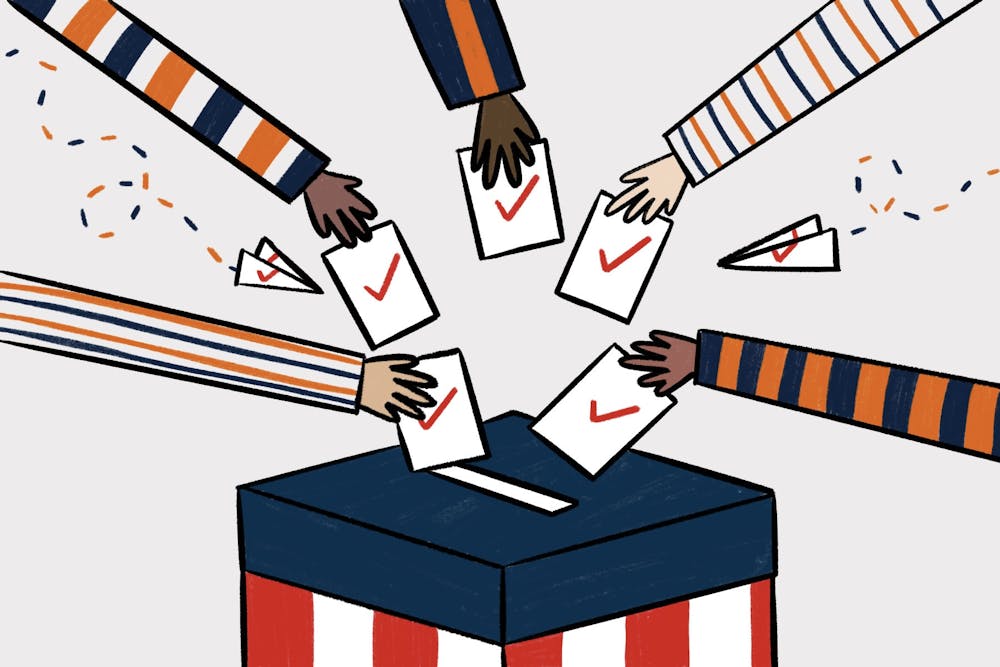Every four years, citizens are presented with the opportunity to go vote for president. While it is common for younger generations not to vote, there's a possibility that college students would vote more often if voting was more accessible.
Voting for the leader of our country is one of the most important decisions that happen every four years. Because of this, election day should be a federal holiday. Each citizen deserves to make their voice heard by casting their vote, and they deserve not only a day off from work to honor their voice but also a day off in order to be uninhibited by their schedules.
College students face particular challenges by being displaced from their voting county and being held to strict attendance policies with school or jobs. Younger voters have the potential to make an impact when voting for their country’s leader. This voting group, aged 18 to 29, was at an all-time high in the 2020 election, with 52.5% of them making their voices heard. This turnout is contrasted by the 2014 election, where the rate was 16.3%.
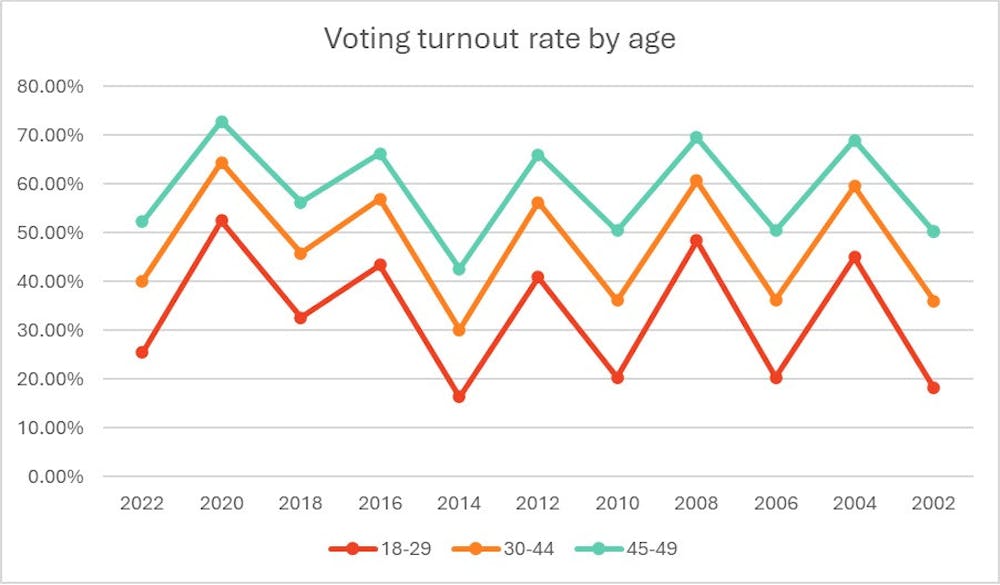
Graph of voting turnout by age for Presidential elections since 2002 | Data contributed by the University of Florida department of political science
Specifically among college students, the 2020 election proved to be an all-time high, with a 76.9% turnout, this age group is trending toward more engagement and involvement in their country, wanting their voice heard more.
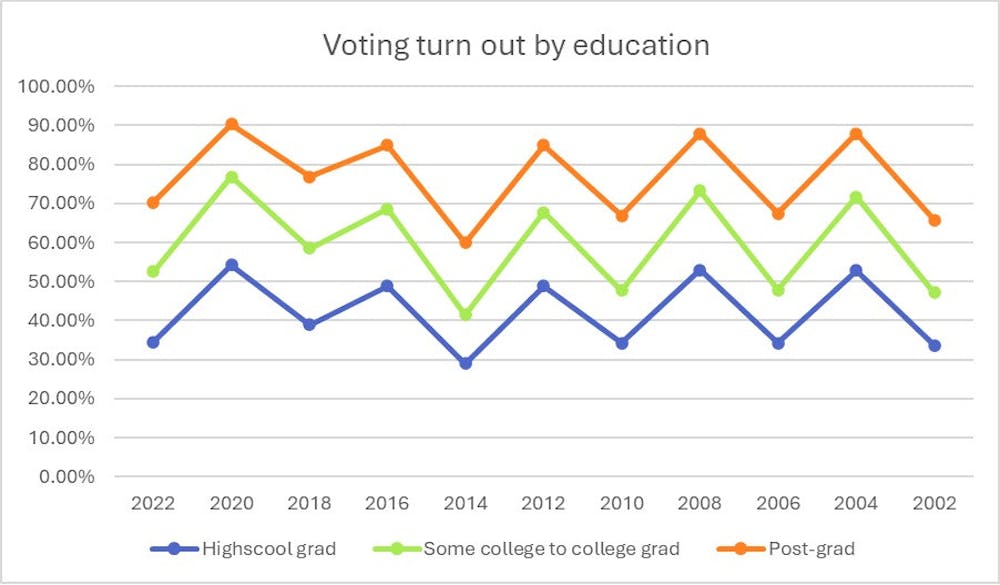
Graph of voting turnout by education for Presidential elections since 2002 | Data contributed by the University of Florida department of political science
While voting is lower among young and college student voters compared to older voters, Gen Z’s voice in politics has become very important. Since 2020, Gen Z has been showing up in politics more and more. This trend needs to continue and be encouraged.
It is a lot of younger voters’ first time voting. They are eager to be involved in the biggest vote of the nation. However, with the accessibility that colleges and universities grant to students to vote, it is difficult for this age group to cast their vote and make their voice heard.
The current options that are presented to college students aren’t always useful to them, especially in Alabama. Absentee ballots, first introduced in the 2020 election, due to the COVID-19 pandemic are hard to access. The application is confusing and it is rare that college students receive them, even if they are attending school outside of their registered county. There’s also no early voting in the state, which creates more conflicts for voters and leaves a smaller window of time to vote.
The point of these ballots, for college students at least, is to have access to vote in their home county without conflict. In the chance that students cannot get an absentee ballot, they'd have to travel home or skip voting all together if they have a class or classes with mandatory attendance policies, since it would be hard to leave to vote.
Some universities are presenting their students and faculty with the opportunity to go vote by cancelling classes on election day, and 2.9% of colleges in the United States observe election day as a day for classes to be canceled.
Students at Ohio State University and Drexel University all have a bigger voting turn out because their classes were either cancelled or asynchronous on election day, as seen in data from the 2020 election.
Whether its a university-wide decision or a class-by-class decision, canceling classes, making them asynchronous or making them optional would give students more accessibility to vote. Students in Columbus, OH and Philadelphia, PA have had success in casting their votes near their campus area.
The black dot on the maps pictured below indicates where the respective colleges and universities are that give their students a day off. These maps have areas where color is more dense due to the amount of people voting in that respective area.
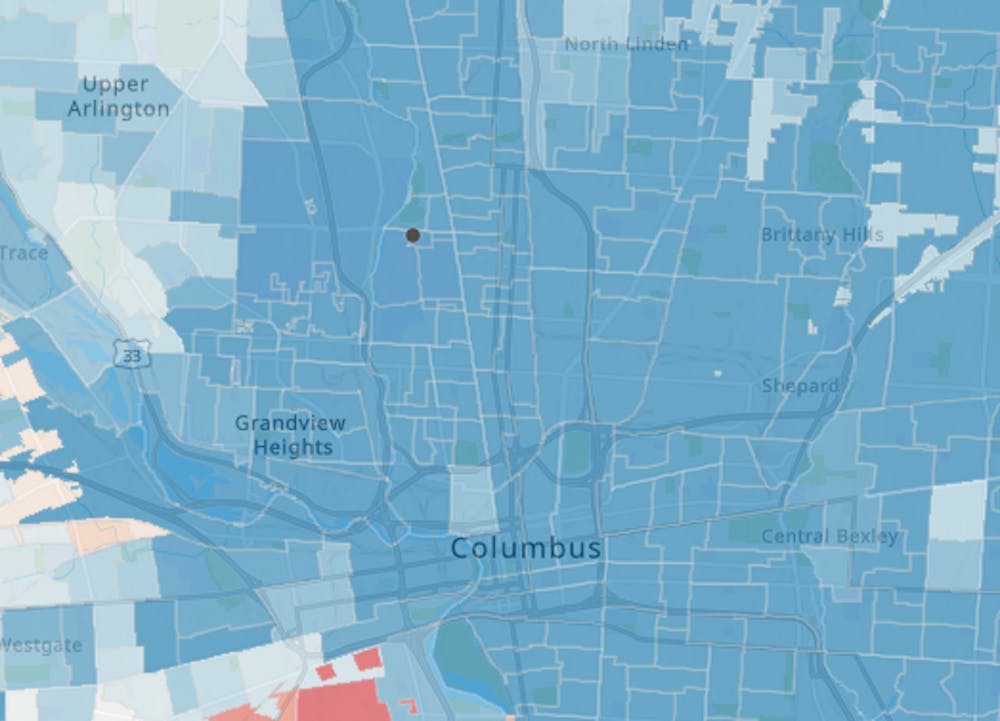
Map of 2020 Presidential election results in Columbus, OH | Contributed by the University of Florida department of political science
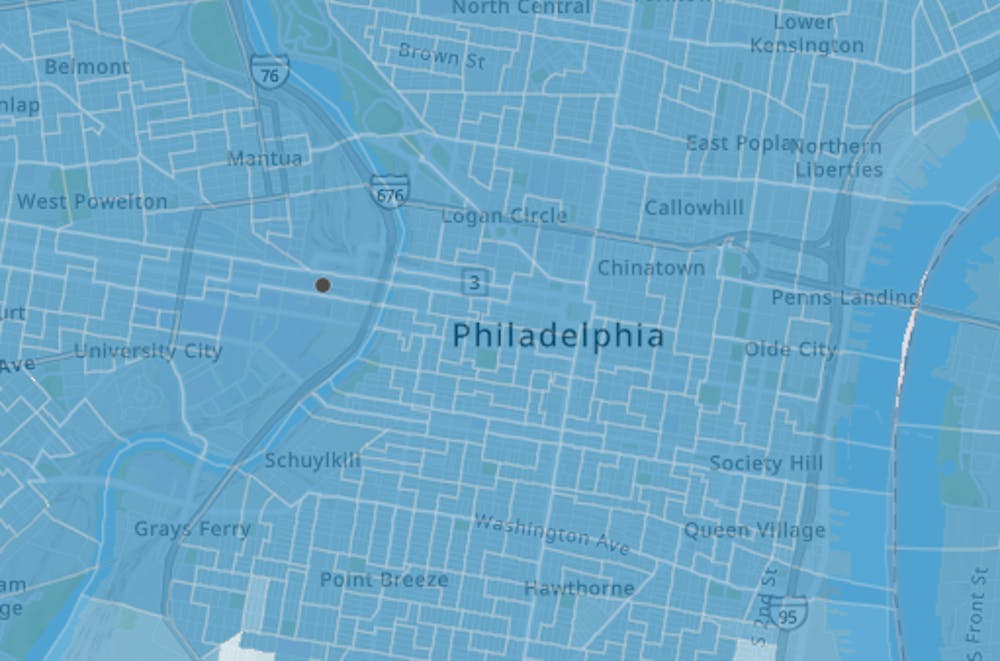
Map of 2020 Presidential election results in Philadelphia, PA | Contributed by the University of Florida department of political science
Compared to other universities around the United States, or even the state of Alabama, Auburn University isn’t making an effort to provide voting accessibility for its students. The lack of color in one area in the Auburn map is a majority of the university area. This indicates a lack of voting, especially compared to the colleges and universities pictured above, who have deep colors all around their campus.
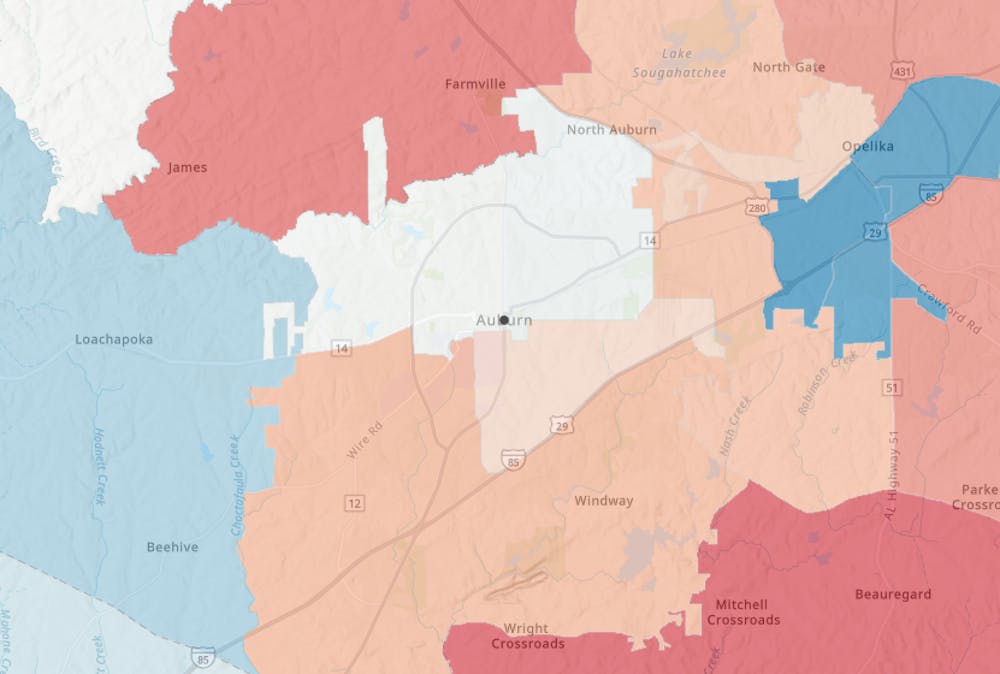
Map of 2020 Presidential election results in Auburn, AL | Contributed by the University of Florida department of political science
To grant access for students to vote, Auburn could do many things to become more accommodating. The most obvious would be for the university to have a class cancellation on election day. As previously seen, when students are given the day off for election day, the voting turn-out is more prominent.
Whether they’re registered to vote in their university’s area, or whether they’re registered to vote in their home county, students will take the chance to vote when given the chance. Obviously if they’re registered at home and live far away, it would be harder for them to physically go vote in just one day; so a full day off in addition to leniency would be helpful. Making voting a university-approved excuse is also a viable option.
Closing the entire university for election day would give professors, faculty, staff and all student workers time off to go vote, without having to miss out on anything. Some student workers have class and work on election day, which will leave them little time to drive to the poll — if they have a car — and vote.
Polls are only open in Alabama from 7 a.m. to 7 p.m. which may prevent university affiliates with a busy schedule from voting. Students especially are busy with: classes, homework and personal jobs — all mandatory pursuits. Auburn University should do what it can to ensure these factors do not restrict a student's opportunity to vote.
Yes, absentee ballots are for these extenuating circumstances, however, it’s also would be valuable to offer something else for students that live far away and want to vote in-person. For instance, university officials could schedule fall break to fall on election day every four years.
Of course, it might be “too late” to have fall break during the 2024 election. It is also a lot later than the university typically schedules fall break; but election day comes once every four years. It would be beneficial to modify the schedule in this way every four years so that out of state students have the chance to go home and vote, as well as enjoy themselves over fall break.
Ultimately, this day should be a federally recognized holiday, but until then we must do what we can to give people the opportunity to participate in the inner-workings of their country. There are only 11 federally recognized holidays, with inauguration day recognized for employees in Washington D.C. and the surrounding area. Observing the presidential election day in a federal manner would not be any different from recognizing the inauguration. It is a very good reason to give every citizen a day off.
It would allow for those with a busy schedule time to do their civic duty and to cast their vote. It would create more respect for the election process. Not only would busy college students and their professors have the chance to go vote, but all citizens would.
It would be one day off from school and work that occurs every four years and it’s one of the most important and consequential days for all United States citizens. Auburn students — and everyone — deserve to have the day off. They deserve the accessible, convenient opportunity to cast their vote.
Do you like this story? The Plainsman doesn't accept money from tuition or student fees, and we don't charge a subscription fee. But you can donate to support The Plainsman.
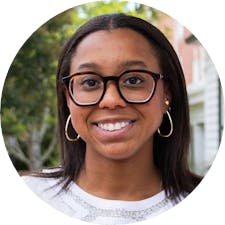
Brychelle Brooks, senior majoring in public and professional writing with a minor in information systems, has been with The Auburn Plainsman since August 2023. She previously served as the Campus Reporter, Opinion Editor and Newsletter Editor. She is currently serving as the Editor-in-Chief.
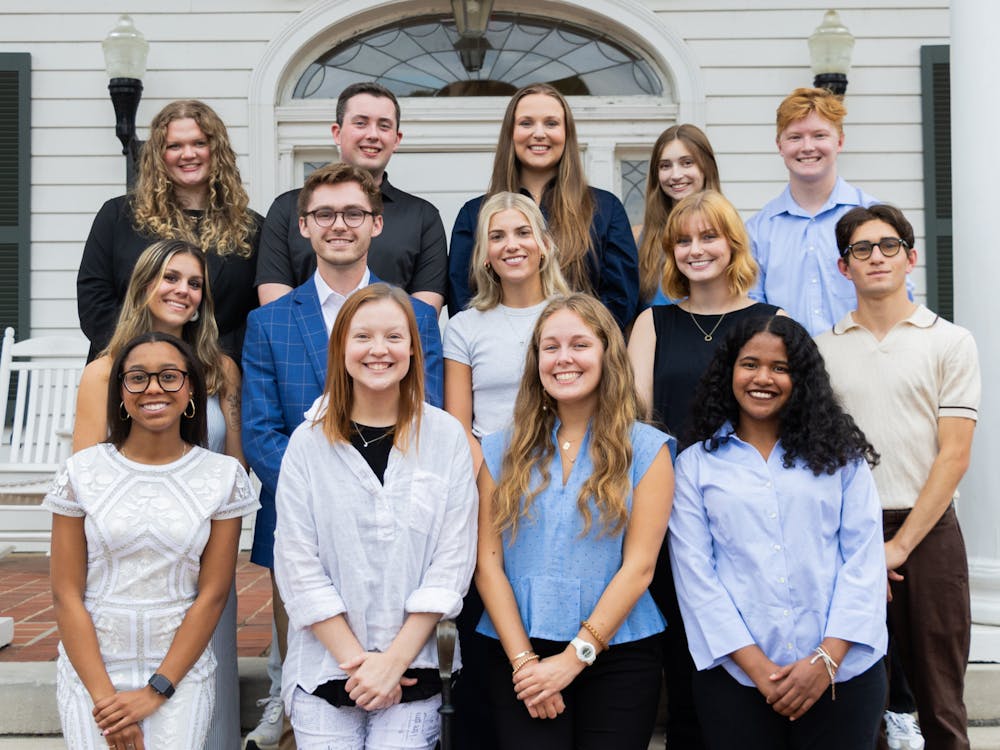
The Plainsman Editorial Board for the fall of 2024 is composed of Harlee Meydrech, Tucker Massey, Emily May, Sami Grace Donnelly, Piper Bosart, Connor Copeland, Esther Bindosano, Brychelle Brooks, Patrick Bingham, Grace Heim, Michaela Yielding, Rachel Swan, Ella Walton, Sam Vise, Luca Flores and Madison Champion.

